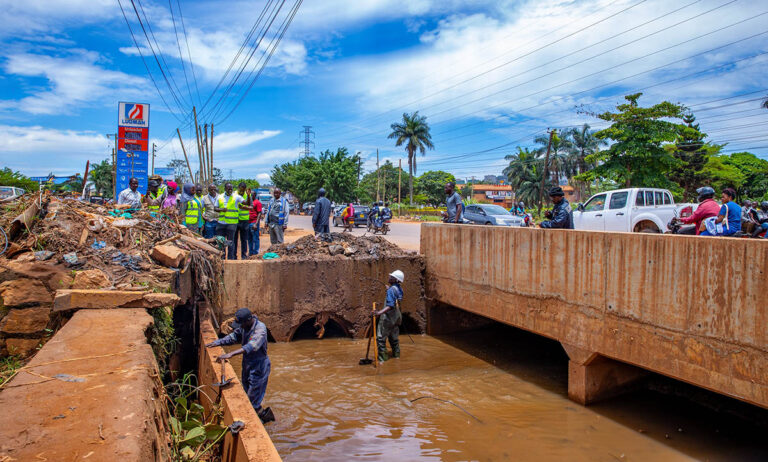The Executive Director of the Kampala Capital City Authority (KCCA), Sharifah Buzeki, together with her deputy, Benon Kigenyi, spent the yesterday afternoon surveying key flooding hotspots in the Kyambogo and Kinawataka areas.
Their visit was aimed at assessing the severity of the problem and formulating long-term solutions to mitigate flooding, which has been a persistent challenge in these communities.
Heavy rainfall in Kampala has increasingly led to severe flooding, disrupting businesses, damaging infrastructure, and posing risks to residents’ health and safety.
Areas like Kyambogo and Kinawataka have been particularly affected, with roads often becoming impassable and drainage channels overwhelmed by the volume of water and debris.
Speaking during the inspection, Buzeki emphasized the need for urgent intervention to prevent further damage and ensure residents’ safety.
“We are here today to identify the most affected spots and develop sustainable solutions to the flooding issue. We recognize that poor drainage maintenance and human activities are major contributors to the problem,” she stated.
KCCA has launched an initiative under the #KCCAatWork campaign to address human behaviors that exacerbate flooding.
The campaign focuses on sensitizing the public and enforcing regulations against indiscriminate littering and encroachment on drainage channels.
According to Buzeki, blocked drainage systems, caused by the illegal disposal of waste and structures built too close to drainage reserves, significantly worsen the situation during heavy rains.
“Enforcement and community engagement go hand in hand. While we are committed to upgrading drainage infrastructure, we also need to change behaviors that contribute to the problem. Residents must understand that throwing waste into drainage channels has far-reaching consequences,” she added.
Deputy Executive Director Benon Kigenyi echoed these sentiments, highlighting the importance of collaborative efforts between authorities and the public.
“Flooding is not just a government issue; it affects everyone. We need cooperation from local leaders, businesses, and residents to ensure drainage systems remain clear and functional. Enforcement alone is not enough—we need a mindset shift,” Kigenyi remarked.
To tackle the crisis, KCCA plans to intensify its drainage improvement projects, including expanding and rehabilitating key drainage channels, clearing clogged water pathways, and reinforcing embankments to prevent erosion.
The authority also plans to roll out stricter penalties for those found violating waste disposal regulations and encroaching on water drainage reserves.
Local residents and business owners welcomed the move, expressing hope that KCCA’s intervention will provide lasting relief.
However, some remain skeptical about whether enforcement measures will be sustained over time. “We have seen drainage cleaning efforts before, but without consistent monitoring, the problem always comes back.
We need a long-term commitment from the authorities,” said a shop owner in Kinawataka.
Environmental experts have long warned that urban flooding in Kampala is worsened by unplanned urbanization and poor waste management practices.
They emphasize that tackling these issues requires a multi-faceted approach, combining infrastructural development with strict policy enforcement and community education.
As KCCA intensifies efforts to combat flooding, the authority is urging residents to take an active role in maintaining a cleaner environment.
The success of these measures will depend not only on government action but also on the willingness of the community to adopt responsible waste disposal habits and respect urban planning guidelines.
With continued monitoring, investment in drainage systems, and public cooperation, KCCA hopes to significantly reduce the impact of flooding in Kyambogo, Kinawataka, and other vulnerable areas in Kampala.
The next few months will be crucial in determining the effectiveness of these interventions and whether they will bring the much-needed relief to residents affected by recurrent floods.

